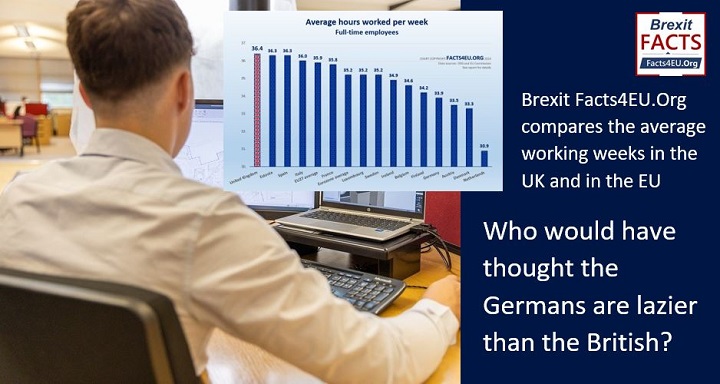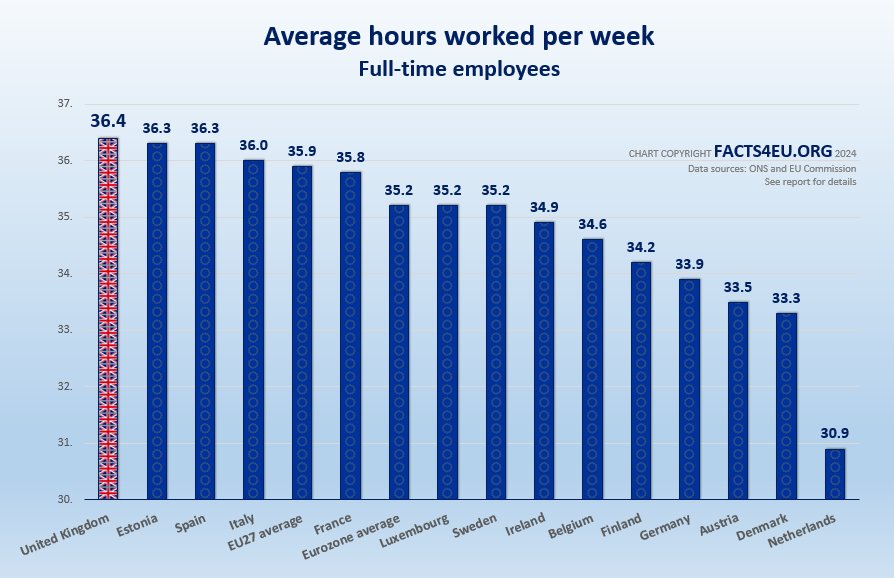Who would have thought the Germans are lazier than the British?
Average Brit works 18% harder than Dutch, 7.5% harder than Germans, 3.5% harder than Eurozone average
Montage © Facts4EU.Org 2024
Brexit Facts4EU.Org compares the average working weeks in the UK and in the EU
In the last two weeks both the ONS and the EU’s statistics agency have released their latest figures on the average number of hours worked each week by full-time employees. These show that British workers - in the past chastised for their work ethic - are working more hours each week than their counterparts in Germany and in other Eurozone countries.
The media is full of stories about those who have not gone back to work after the Covid lockdowns – quite rightly – but our analysis of the data from the UK and the Eurozone shows some surprising results.
Brexit Facts4EU.Org Summary
Average hours worked per week by full-time employees, latest figures for 2023
- United Kingdom : 36.4
- Estonia : 36.3
- Spain : 36.3
- Italy : 36.0
- EU27 average : 35.9
- France : 35.8
- Eurozone average : 35.2
- Luxembourg : 35.2
- Sweden : 35.2
- Ireland : 34.9
- Belgium : 34.6
- Finland : 34.2
- Germany : 33.9
- Austria : 33.5
- Denmark : 33.3
- Netherlands : 30.9
[Sources: ONS and Eurostat.]
© Brexit Facts4EU.Org 2024 - click to enlarge
British workers work harder than those in the major EU economies
Last year British workers beat their counterparts in each of the EU’s three top economies: Germany, France, and Italy. In each case British workers worked longer hours each week, on average.
British workers also beat the Eurozone and EU27 averages.
What is an ‘average working week’?
Average weekly hours are the number of hours usually worked per week in the main job that comprises all hours including extra hours, either paid or unpaid, which the person normally works.
This includes production activities, ancillary activities (travel between different places of work and personnel management), and education and training necessary for carrying out the work. This excludes the travelling time between home and workplace, the time for the main meal break, education and non-job-related training.
Average weekly hours are the number of hours actually worked per week in the individual’s main job, namely the hours spent in work activities including unpaid overtime. Periods of absence from work, such as sick leave, holidays and commuting time, are not included.
Observations
The fact that British workers on average work longer hours than the Germans, the French, the Italians, and than the Eurozone and EU27 averages might surprise some readers. Nevertheless this is the case, according to the official figures.
Naturally hours worked do not necessarily translate into productivity, which is what really matters. Nevertheless we found the results of our analysis interesting and we hope readers did too. If nothing else, it shows that national stereotypes may need re-evaluating.
Finally, we ask those who use our comments facility to keep to the topic of the daily reports. After the news yesterday about Nigel Farage we realise it will be tempting for commenters to talk about this. Please note that there will be an opportunity to do this very shortly. We have some exclusive news about Reform UK which we will be publishing as soon as possible.
If you want our daily reports to continue, please do something now
Facts4EU.Org badly, badly needs you today. We are a 'not for profit' team (we make a loss) and any payment you make goes towards the actual work, not plush London offices, lunch or taxi expenses, or other luxuries of some organisations.
We desperately need more of our thousands of readers to become members, to support this work. Could this be you, today? It's quick and easy, we give you a choice of two highly secure payment providers, and we do NOT ask you for further support if you pay once. We just hope you keep supporting us. Your membership stays anonymous unless you tell us otherwise.
Please don't assume that other people will keep us going - we don't receive enough to survive and we need your help today. Could you help us? We rely 100% on public contributions from readers like you.
If you believe in a fully-free, independent, and sovereign United Kingdom, please join now by clicking on one of the links below or you can use our Support page here. You will receive a personal, friendly ‘thank you’ from a member of our team within 48 hours. Thank you.
[ Sources: ONS | EU Commission ] Politicians and journalists can contact us for details, as ever.
Brexit Facts4EU.Org, Tues 04 Jun 2024
Click here to go to our news headlines
Please scroll down to COMMENT on the above article.
And don't forget actually to post your message after you have previewed it!
Since before the EU Referendum, Brexit Facts4EU.Org
has been the most prolific researcher and publisher of Brexit facts in the world.
Supported by MPs, MEPs, & other groups, our work has impact.
We think facts matter. Please donate today, so that we can continue to ensure a clean Brexit is finally delivered.
Paypal Users Only - Choose amount first
Quick One-off
Monthly




Something to say about this? Scroll down for reader comments